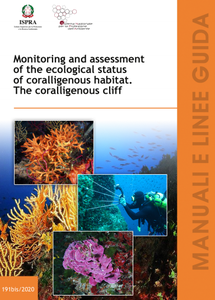Monitoring and assessment of the ecological status of coralligenous habitat. The coralligenous cliff (English version)
European legislation requires the development of monitoring and assessment plans based on standardized methods, in order to allow the comparability of results on a wide spatial and time scale. These plans must also be based on the best available technical-scientific knowledge, which evolution is considered a fundamental basis for the periodic updating of marine environment protecting strategies.
The aim of this manual is to provide a guide to the use of an integrated and standardized procedure for monitoring and assessing the health condition of coralligenous developing on vertical cliff as rims, which is the most widespread coralligenous type in the Mediterranean to the first 40m of depth and the most exposed to anthropogenic pressures and environmental changes.
The methodology here presented has been successfully tested and validated at the Western Mediterranean sub-region scale and it is the result of multi-years scientific researches on the ecological indicators responding to anthropogenic pressures, which then culminated in an integration and standardization of the mostly used methods in the Mediterranean in an unique sampling and data collection procedure called STAR (STAndaRdized coralligenous evaluation procedure). STAR is performed following a non-destructive, simple but effective protocol, which optimizes balance between sampling effort and type of information obtained.
The document is structured as general guidelines and theoretical-practical methodological manual at the same time, to guide the operator step by step in the application of the methodology through all its phases, from the planning of field activities to the final classification of the ecological quality of the investigated coralligenous assemblages. For this purpose, the manual has been divided into an Introduction part and a Practical part and the more descriptive practical sessions have been reported in 6 work Sheets, in support of which 4 technical Annexes are made available (Annex A in the text, Annexes B-D as separated attached files).
This version is the English translation of the nr.191 MLG italian version.
Publication available only on-line
Download the publication (pdf 12 mb)
ANNEX B - Photo cards for taxa-groups identification (zip - 250 mb)
ANNEX C - Practical examples of processed images (zip - 18.2 mb)
ANNEX D - Excel format (zip - 2.47 mb)

